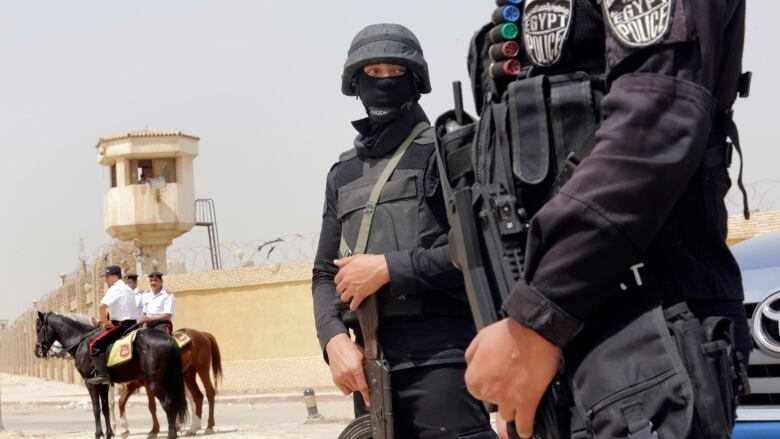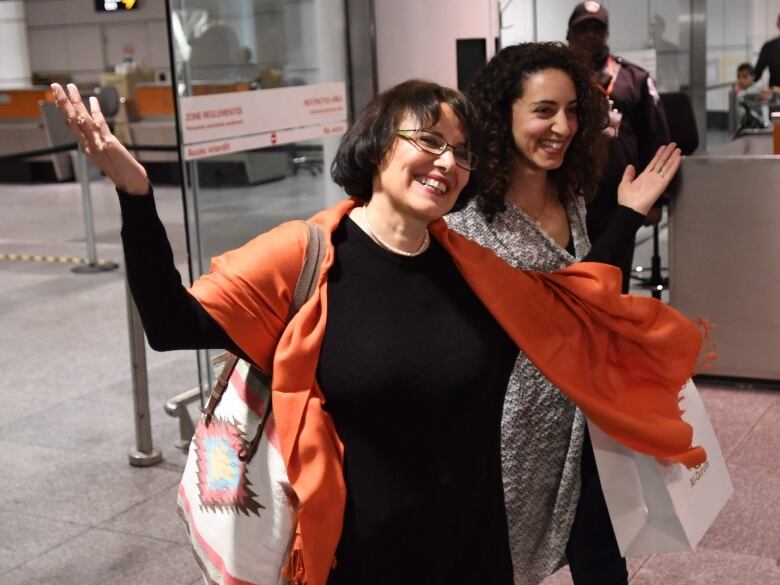Canada needs a law protecting citizens imprisoned abroad: Mohamed Fahmy
Other countries have enshrined consular protection for foreign detainees in federal law. Why hasn't Canada?

Canadians who work, study and travel abroad might be astonished to learn they are not guaranteed consular assistance if they get into trouble overseas. Rather, consular intervention is left to the discretion of Global Affairs Canada.
As a former political prisoner in Egypt jailed unjustly for "conspiring with a terrorist group and fabricating news" while working for Al Jazeera News in 2013 I understand the importance of having your country on your side. I've also worked as an International Red Cross protection officer, visiting prisoners, Canadians included, in Lebanon's prisons, and I know that time is never on their side. The faster officials intervene, the better. But while the U.S., Germany, Brazil, the U.K., South Africa and at least 28 other countries have enshrined consular protection in federal law, Canada lags.
No legal obligation
According to Global Affairs Canada, there are roughly 1,400 Canadians currently detained abroad, and many of them are facing grave human rights violations. While Canadian officials often do get involved in these cases, they remain under no legal obligation to do so.
After my own release in 2015, I met with former Canadian ambassador and director general of consular affairs Henry Garfield "Gar" Pardy in Ottawa. His deep knowledge, experience and determination to address this gap in law was exactly what I was looking for during my search for answers.
In his 2016 report entitled Canadians Abroad: A Policy and Legislative Agenda released by the Rideau Institute and the Canadian Centre for Policy Alternatives (CCPA), Pardy notes that of the millions of Canadians outside of Canada at any given time, "hundreds languish in foreign prisons on specious charges."
The study outlines how, over the last decade, the Conservative government limited its responsibility to support and safeguard its citizens abroad evidenced in particular in cases involving Omar Khadr and his brothers. "The historical Canadian approach of the universality of consular services for all Canadians was undermined," says Pardy. "The result has been inequity, unfairness and inconsistency in the provision of these vital services."
Canada's current "discretionary" approach, Pardy explains, means the government can theoretically choose to do nothing or everything to free Canadians detained, jailed or even tortured in the prisons of autocratic and repressive regimes.
'May take steps...'
Indeed, according to the Government of Canada's travel assistance information, the government "may take steps to pressure the foreign authorities to abide by their international human rights obligations" in cases where a Canadian's human rights are being violated (emphasis added). The situation is murkier in cases where an imprisoned Canadian holds dual citizenship, since a foreign government might not recognize the legality of Canadian citizenship a situation that the Canadian government acknowledges "could limit the ability of the Government of Canada to assist."
Since my release, I've partnered with Alex Neve, secretary general of Amnesty International Canada and an unflagging champion of human rights, on a mission to better protect Canadians abroad. We believe it's high time for Canada to enshrine a new law that obligates our government to intervene when our citizens are imprisoned in a foreign country.
Obviously there are many details to work out in terms of defining the scope of the law including exactly how, when and where the Canadian government would take action but certainly in cases where international human rights have been breached, consular officials should, by law, be required to intervene.
Earlier in 2016, Neve and I presented a 12-point "protection charter" to the Liberal government in Ottawa. A coalition of lawyers, former prisoners, diplomats and Canadian civil society organizations have since endorsed our call for action, and we are optimistic about a new era of change.

An encouraging recent example is that of Kevin Garratt the Canadian Christian aid worker who ran a caf in the city of Dandong and was arrested on spying charges.
The Chinese government released Garratt in September 2016, just over a week after Prime Minister Justin Trudeau visited China. In that case, as in the case of Homa Hoodfar, the Concordia professor who was imprisoned in Iran for supposed propaganda against the state, the happy resolution was the result of the Canadian government's decision to engage in careful and quiet diplomacy.
The move to intervene in these and similar cases should not really be a choice, however, which is why Canada needs a law. Pardy argues that by maintaining its "discretionary" Crown prerogative, the Canadian government retains the right to act as it pleases on consular matters, forcing families of those detained abroad to often seek redress from the courts. But it shouldn't have to be this way.
The next milestone in our mission will be to introduce a private member's bill to Parliament, in hopes of a successful vote and new legislation that will ensure Canadians who travel the globe receive the protection they deserve, as citizens of a democratic country. When those peopleare detained, unjustly, in foreign prisons, that country should be obliged to intervene.
This column is anopinion. For more information about our commentary section, please read thiseditor'sblogandour FAQ.












_(720p).jpg)


 OFFICIAL HD MUSIC VIDEO.jpg)
.jpg)



























































































